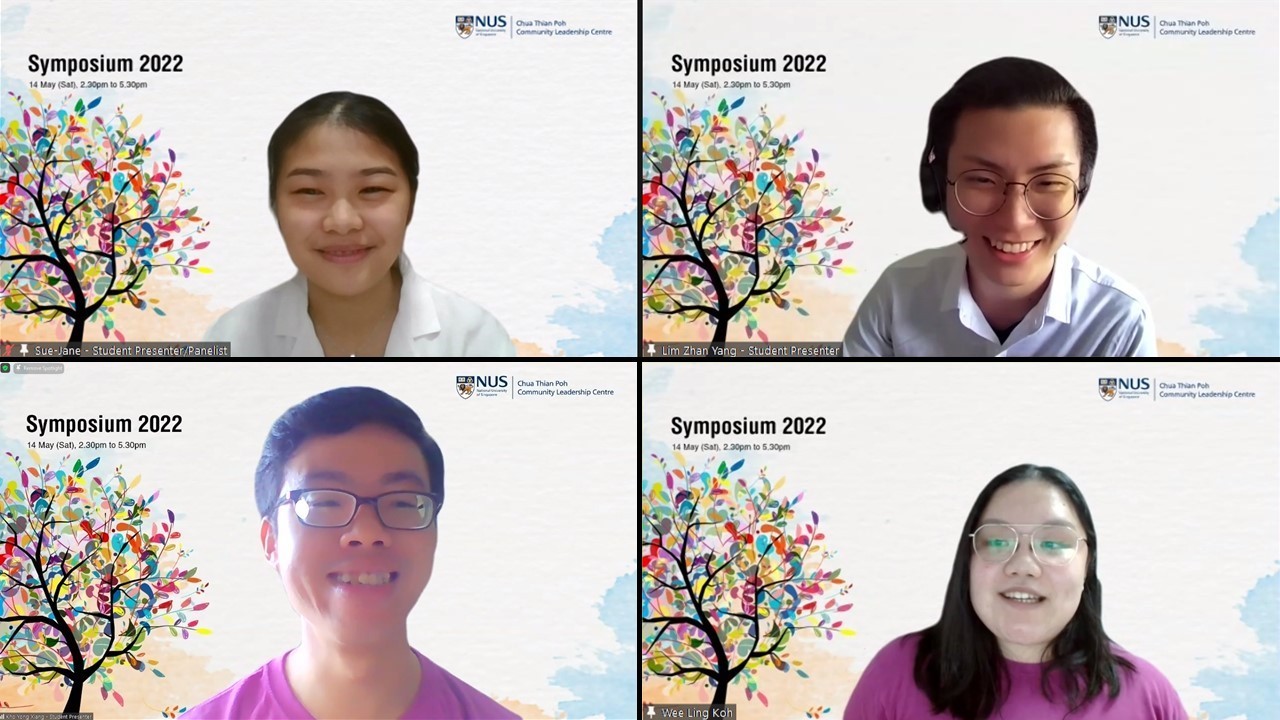Creating impact with community-based research
Empowering youths in Singapore, the future role of community hospitals, and women’s sexual health: these were some of the subjects explored by students of the NUS Chua Thian Poh Community Leadership Centre (CTPCLC) in their practicum projects.
Showcased at the recent 10th CTPCLC symposium, these projects affirm the importance of students applying their learning in the local community, and creating lasting social impact. Held on 14 May, the symposium – also the Centre’s flagship annual event – brought thought leaders and changemakers together for a fruitful engagement on community issues.
Graced by guest-of-honour Mr Alvin Tan, Minister of State for Culture, Community and Youth, and Trade and Industry, the virtual event this year was attended by more than 120 NUS students, staff and alumni, as well as stakeholders from the public and social sectors.
In his opening address, NUS President Professor Tan Eng Chye conveyed deep appreciation for Dr Chua Thian Poh’s immense generosity and support in nurturing NUS students to be “future changemakers”. He also expressed his hope for students at CTPCLC to “enable inclusion and positive change” in the community, guided by the Centre’s five-point value system of compassion, inclusivity, equity, respect and integrity.
A collaborative formula for positive impact
The three projects featured at the symposium were undertaken by NUS students in collaboration with various partner organisations, underscoring a collaborative approach towards creating positive impact in society.
Cheow Sue-Jane and Lim Zhan Yang, Year 4 students from Psychology and Political Science respectively, shared their research findings on the developmental outcomes of youths who had completed a youth changemaker programme run by social enterprise Make The Change (MTC). They found that the youths had expanded their knowledge of the social enterprise sector, and developed their technical skills and interest in serving others. The team’s findings will also guide MTC, which conducts social innovation learning programmes, in the design of future programmes for youths.
The various opportunities for community hospitals in meeting future healthcare needs was the focus of a team led by fourth-year Communications and New Media student Kho Yong Xiang. Guided by the question “How will Singapore's community hospitals look like in the future?”, the team collaborated with the MOH Office for Healthcare Transformation, a unit that takes an experimental and evidence-based approach to redesigning healthcare in Singapore. Together, they identified potential roles that future community hospitals can play within the Singapore healthcare ecosystem, and how the ecosystem can stay agile and move in step with Singapore's changing social demographics.
In presenting her group’s study of Action for AIDS’ (AfA) Love and Sexual Health programme, Koh Wee Ling, a graduate from the CTPCLC programme, elaborated on findings on sexual behaviours and attitudes of young women, as well as their understanding of Human Immunodeficiency Virus and prevention methods for sexually transmitted infections. The outcomes will contribute to AfA’s programme development in raising awareness about sexual health.
CTPCLC Director, Associate Professor Chng Huang Hoon, expressed her pride in how students are contributing to positive change in Singapore society through their research. “Our students’ research signals the first essential step in which they have taken to become impactful youth changemakers in years to come”, she said.
Mental health in Singapore: A growing challenge?
This year’s symposium also featured a panel discussion, “Mental health in Singapore: A growing challenge?”. Moderated by CTPCLC instructor Dr Kevin Tan, the discussion – featuring panellists Minister of State Mr Alvin Tan, Mr Tim Lee of Caregivers Alliance Limited, Mr Khoo Yi Feng of Limitless Singapore, and NUS-CTPCLC student Ms Cheow Sue-Jane –offered insights on how different community stakeholders can respond to growing mental health concerns in Singapore.
Minister of State Mr Alvin Tan said that an inter-agency taskforce has been set up to address mental health and well-being issues in Singapore, as the government seeks to co-create solutions to improve the mental health ecosystem in Singapore. He iterated the importance of looking out for others and practising self-care to tend to one’s mental health and well-being. Mr Tan also shared that the taskforce, which has been reviewing the population’s mental health needs, will be launching a public consultation in the coming weeks. He encouraged the audience to look out for the consultation sessions.
As fellow panellist Khoo Yi Feng also characterised it, “mental health needs to be a leadership priority that requires the urgent attention of all levels of institutions, because it has profound implications for performance and collective well-being”.
By NUS Chua Thian Poh Community Leadership Centre



